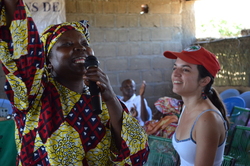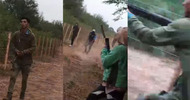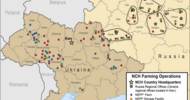Grassroots International | November 28th, 2011
A global alliance emerges in West Africa
By Salena Tramel
Selingué, Mali—Early morning on day one of the first peasant-organized international conference to stop land grabbing held in Nyéléni, Mali, delegates from more than 30 countries took their seats for the opening ceremony. Many fumbled with the bulky and crackling radios that would provide simultaneous translation, while a small group of women from across Africa gathered in the center of the open-air conference hall, their feet sinking into the sand. In a long-standing tradition of the Via Campesina, the global peasant movement, the women kicked off the events with a mistica—a ceremony intended to depict socio-political struggles and incite debate.
That debate, and the three-day forum at Nyéléni, had been a long time in the making. Outraged by their governments’ increasing willingness to sell or lease prime farmland to foreign investors on the cheap, social movements and grassroots organizations around the world issued a chain of pleas. Notable among those are the Kolongo Appeal, written in the wake of Mali’s most contentious land grab to date, and the Dakar Appeal, following the World Social Forum earlier this year.
“The land has belonged to our communities for generations,” said Ibrahima Coulibaly, president of the National Confederation of Peasant Organizations (a Via Campesina member) in Mali during one of the plenary sessions. He added, “We are here to find solutions, to fight together against the national and multinational agendas that seek to displace us. That all starts with telling our stories and organizing to mobilize farmers.”
“We are so impressed with the African movements,” said Rafael Alegría, a founding Via Campesina member from Honduras. “They have helped us articulate a truly global voice.” Land grabbing, a global phenomenon, has resulted in multinational corporations, financial speculators, sovereign wealth funds, and richer countries sweeping up between 40-50 million acres of land from 2006-09 alone. Africa, has been especially hit.
A man in traditional white Senegalese kaftan dress sitting next to me clutched a string of wooden prayer beads. “I’m Diery Gaye,” he offered, his voice quiet but strong. “What do you know about African movements?” he asked. I told him that I was eager to learn more. He let go of his beads, leaned over, and took my notebook—drawing an intricate map of organizing from the local to the Pan-African level.
Diery, who is a representative from the Senegalese rural development network, the National Council for Rural Dialogue and Cooperation (CNCR), explained that land grabbing is a relatively new phenomenon in his country, describing it as out-of-control decisions from above that must be fought from below. Diery is a small producer in Niayes, a coastal region that is Senegal’s breadbasket—thus all the more susceptible to being swept up by foreign investors. “It comforts us to be here in Mali, to know that there are others fighting this same kind of colonization and expulsion,” he said, “The peasant cause unites us.”
Maria Luiza Agusta Clodé, a young woman from Guinea-Bissau shared similar sentiments. In her country, the State often expropriates land from peasants, offering no compensation to its residents. “Throughout these few days, we have exchanged our experiences as farmers,” she said. “I have learned that land grabbing is slightly different in every country—but the consequences are always the same. Without land, we cannot live.”
Delegates strategized late into the nights, resolving to make land rights a reality. On the final day, both exhausted and energized, they read the fruition of their work—the Final Declaration to Stop Land Grabbing.
“I’m so excited,” exclaimed Lalla Aïcha Sy, a small farmer from Mauritania. “This is a milestone for all of us,” she explained. The declaration calls for all organizations committed to its principles and actions to join the new Global Alliance against Land Grabbing, launched in Nyéléni.
At dusk on the last day, a Malian woman took my hand and led me outside for the closing mistica. This time, a small group of peasant leaders from Latin America and the Caribbean led the ceremony. And this time, some of the heaviness lifted when they enacted the powerful potential of the hard work done in a small West African village.
Grassroots International partially funded the Via Campesina/CNOP’s organizing of this conference. Grassroots consultant Salena Tramel attended the conference and wrote this blog.
Photo by Salena Tramel
A global alliance emerges in West Africa
By Salena Tramel
Selingué, Mali—Early morning on day one of the first peasant-organized international conference to stop land grabbing held in Nyéléni, Mali, delegates from more than 30 countries took their seats for the opening ceremony. Many fumbled with the bulky and crackling radios that would provide simultaneous translation, while a small group of women from across Africa gathered in the center of the open-air conference hall, their feet sinking into the sand. In a long-standing tradition of the Via Campesina, the global peasant movement, the women kicked off the events with a mistica—a ceremony intended to depict socio-political struggles and incite debate.
That debate, and the three-day forum at Nyéléni, had been a long time in the making. Outraged by their governments’ increasing willingness to sell or lease prime farmland to foreign investors on the cheap, social movements and grassroots organizations around the world issued a chain of pleas. Notable among those are the Kolongo Appeal, written in the wake of Mali’s most contentious land grab to date, and the Dakar Appeal, following the World Social Forum earlier this year.
“The land has belonged to our communities for generations,” said Ibrahima Coulibaly, president of the National Confederation of Peasant Organizations (a Via Campesina member) in Mali during one of the plenary sessions. He added, “We are here to find solutions, to fight together against the national and multinational agendas that seek to displace us. That all starts with telling our stories and organizing to mobilize farmers.”
“We are so impressed with the African movements,” said Rafael Alegría, a founding Via Campesina member from Honduras. “They have helped us articulate a truly global voice.” Land grabbing, a global phenomenon, has resulted in multinational corporations, financial speculators, sovereign wealth funds, and richer countries sweeping up between 40-50 million acres of land from 2006-09 alone. Africa, has been especially hit.
A man in traditional white Senegalese kaftan dress sitting next to me clutched a string of wooden prayer beads. “I’m Diery Gaye,” he offered, his voice quiet but strong. “What do you know about African movements?” he asked. I told him that I was eager to learn more. He let go of his beads, leaned over, and took my notebook—drawing an intricate map of organizing from the local to the Pan-African level.
Diery, who is a representative from the Senegalese rural development network, the National Council for Rural Dialogue and Cooperation (CNCR), explained that land grabbing is a relatively new phenomenon in his country, describing it as out-of-control decisions from above that must be fought from below. Diery is a small producer in Niayes, a coastal region that is Senegal’s breadbasket—thus all the more susceptible to being swept up by foreign investors. “It comforts us to be here in Mali, to know that there are others fighting this same kind of colonization and expulsion,” he said, “The peasant cause unites us.”
Maria Luiza Agusta Clodé, a young woman from Guinea-Bissau shared similar sentiments. In her country, the State often expropriates land from peasants, offering no compensation to its residents. “Throughout these few days, we have exchanged our experiences as farmers,” she said. “I have learned that land grabbing is slightly different in every country—but the consequences are always the same. Without land, we cannot live.”
Delegates strategized late into the nights, resolving to make land rights a reality. On the final day, both exhausted and energized, they read the fruition of their work—the Final Declaration to Stop Land Grabbing.
“I’m so excited,” exclaimed Lalla Aïcha Sy, a small farmer from Mauritania. “This is a milestone for all of us,” she explained. The declaration calls for all organizations committed to its principles and actions to join the new Global Alliance against Land Grabbing, launched in Nyéléni.
At dusk on the last day, a Malian woman took my hand and led me outside for the closing mistica. This time, a small group of peasant leaders from Latin America and the Caribbean led the ceremony. And this time, some of the heaviness lifted when they enacted the powerful potential of the hard work done in a small West African village.
Grassroots International partially funded the Via Campesina/CNOP’s organizing of this conference. Grassroots consultant Salena Tramel attended the conference and wrote this blog.
Photo by Salena Tramel













